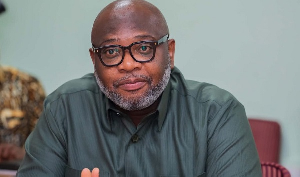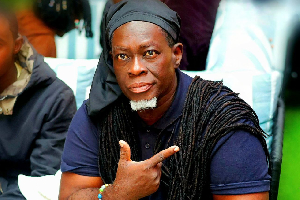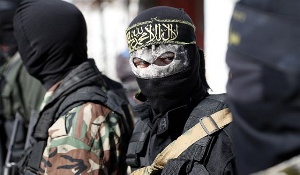...into the UK
...35,000 successful
One of the familiar faces on the diplomatic scene in Ghana, Dr. Rod Pullen, the British High Commissioner, has come to the end of his diplomatic mission in Ghana and would be leaving for home next month.
Dr. Pullen would be remembered as a very media-friendly diplomat, but even more than that, by the traveling Ghanaian public for the stress-free measures he introduced at the consular section of the British High Commission.
Dr Rod Pullen came to Ghana in 2000. A chemist, he was born in 1949 and received his education at Maidstone Grammar School, Mansfield College, Oxford and Sussex Universities.
He worked with the Ministry of Defence from 1975 to 1982 and served in the UK Delegation to NATO, Brussels. He also served in his country's Delegation to the Conference on Security and Cooperation in Europe, (CSCE).
He transferred to the Foreign and Commonwealth Office, FCO, in 1982 and has since then served in Paris, Nairobi and Lagos.One of the highest points of Dr. Pullen's tenure in Ghana was when the Rt. Hon. Tony Blair, Prime Minister, visited Ghana in 2001.
He talked to ADM on some highlights of his stay in Ghana.
Visa Acquisition
The acquisition of British visas by Ghanaians was of great concern to the envoy since that was the main activity that brought many Ghanaians directly in touch with the High Commission.
Last year the section, he said, dealt with some 70,000 visa applicants, about half of which were successful.
Interviews, he said, have been replaced with a system in which applications are dropped for processing without the presence of the applicants. It is only in ten percent of cases that applicants are called for interviews.
The consular section now works extra hours from Monday to Thursday which has reduced considerably the long queues which used to characterize visa application.
Ghana's Economy
Dr Pullen disclosed that the new tough economic measures adopted by the government have registered positive results for which he praised the Kufuor Administration. Events following them have shown that they were right policies he told ADM.
The decisions, he said have achieved an economic growth of between 4% and 5% which he said was not a bad growth rate.
Britain, he disclosed, is working with the Ministry of Private Sector Development, to ensure that the right environment is created to attract investments into the country.
Trade & Aid
Britain the High Commissioner said has great interest in strengthening the trade between her and Ghana. The value of the trade between the two countries stands at one hundred and forty million pounds sterling per annum.
He said Britain is happy with the peer review mechanism of NEPAD which itself, he noted is a good idea because it emanated from Africa. Ghana is the second largest recipient of support from DFID, to the tune of US$100m which has come in the form of an untied grant, allowing the country to buy goods and services from wherever it chooses to.
The agency, he announced, has constructed 180 school blocks in the three northern regions and is also providing a significant support in the form of direct budgetary support to the Ministry of Finance.
Peacekeeping
He paid glowing tribute to the efforts of Ghana in establishing peace in war-torn Liberia and La Cote d'Ivoire.
Having been associated with the Ghana Armed Forces Staff College for the past ten years Britain is conversant with the rich experience of the Ghana Armed Forces in peacekeeping operations.
The year 2007, he observed would be an important one for both his country and Ghana, because the latter would mark her 50th anniversary as an independent nation and his country would on the other hand mark the 200th anniversary of the abolition of slavery and wished that he would have been here.
This being an election year in Ghana, he assured that his country would continue to render support to the Electoral Commission in conjunction with other development partners.
He announced that a large election observation group would be formed to monitor the run-up to the elections and the actual polling activities.












